Dental Implants – Covington, WA
Keeping Teeth in Place Permanently

Dental bridges and dentures were once the only options available for those suffering from tooth loss. However, there is an alternative tooth replacement option that is now allowing millions of individuals to live life without the worry of slipping prosthetics. At Complete Dental Care of Covington, our team is pleased to provide this solution – dental implants. You or a loved one can embrace a smile that will last decades if not a lifetime. If you’d like to learn whether dental implants in Covington are right for you, call us today.
Why Choose Complete Dental Care of Covington for Dental Implants?
- State-of-the-Art, Fully Equipped Dental Implant Clinic
- Cutting-Edge Technology For Added Comfort & Precision
- High-Quality Materials that are Built to Last for a Lifetime
What Are Dental Implants?

Instead of having a prosthetic only replicate the look of a complete smile, dental implants replace a tooth from root to crown. As the only tooth replacement solution that can do this, dental implants offer maximum stability and longevity, allowing you to maintain a permanent smile for 30 years or more. Not only do dental implants allow for greater confidence and an enhanced appearance, but they also make it easier to eat your favorite foods and speak without slurring your words.
The 4-Step Dental Implant Process

There is a four-step process you must go through when receiving dental implants. As a tooth replacement solution that cannot be completed in just days or weeks, it is necessary for each step to be successful before moving on to the next. Our team will go over this in detail during your initial visit so that you are fully aware of what you can expect when preparing for your new smile.
Initial Dental Implant Consultation

The first step is to schedule a consultation with Dr. Navi Dhaliwal. During this visit, she will evaluate your smile to identify how best to move forward with dental implants. Your oral and overall health will be taken into consideration, as you will need to be in good general health if you are to undergo minor oral surgery. If preliminary treatments are needed (i.e., tooth extractions, gum disease treatment, bone grafting), they will be performed before receiving your new teeth.
Dental Implant Surgery

We partner with local dental implant specialists in the area and will refer you to one of them for your implant surgery. You’ll receive anesthesia to numb the areas of your mouth before the implant dentist makes one or more incisions in your gums. This will allow them to properly place each implant post into its designated area. Using a pre-determined depth, they will position your new teeth and close the gum tissue to allow for effective healing.
Dental Implant Osseointegration/Abutment

When returning home, you can expect to spend three to six months recovering and allowing the implants to fuse with the bone in a process known as osseointegration. Once you’re healed, you’ll have your metal abutments, which are small connectors that make it possible for implants to attach to the restoration, put into place. It will likely take several weeks to heal from your abutment placement before you can receive your final restoration.
Delivery of Dental Implant Restorations

Based on the number of teeth that require replacement, Dr. Navi Dhaliwal will attach a dental crown, bridge, or denture over your implant(s) when ready. This new addition will allow you to use your teeth normally and begin to experience the many great benefits that only dental implants can provide.
Benefits of Dental Implants

The benefits of dental implants are practically endless. When you compare them against dental bridges or dentures, it’s easy to see why millions of Americans have chosen permanent prosthetics to replace their missing teeth. Some of the most common benefits of dental implants include greater stimulation to your jawbone to prevent facial sagging, the ability to maintain better oral health because your teeth are easy to clean, and optimal cost-effectiveness because you do not need adjustments or replacements along the way.
Who Dental Implants Can Help
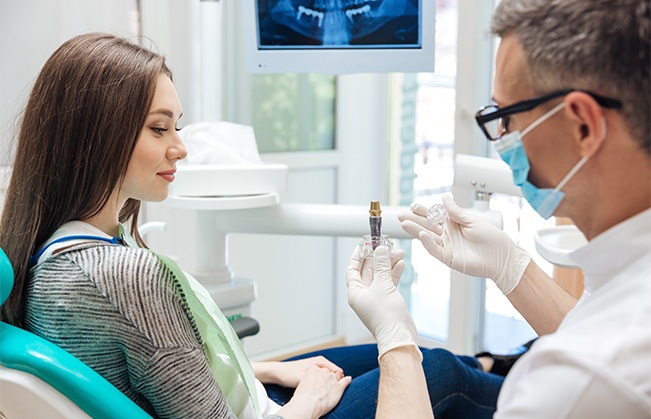
All in all, the number of teeth you’ve lost shouldn’t affect your dental implant candidacy. You’ll likely qualify for treatment as long as your mouth is in fairly good shape. As for the severity of your tooth loss, that’ll only affect the specifics of your implant procedure. Our team can implement various treatment methods once we’ve closely assessed your mouth, thus ensuring you get great results. Simply keep reading or call our office for more details.
Who is a Good Candidate for Dental Implants?
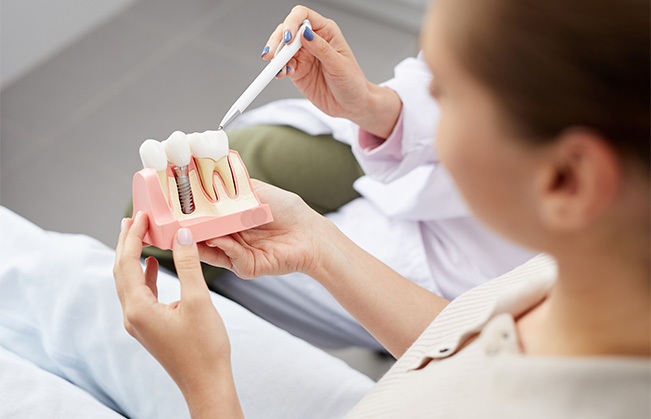
Almost any adult can get dental implants, but the posts suit some patients more than others. The ideal candidate usually has the following traits:
- Good Overall Health – Since dental implants are placed through surgery, your body has to be pretty healthy for treatment.
- Excellent Oral Health – Issues like cavities and gum disease can make dental implants fail, so they should be addressed first.
- High Jaw Density – For dental implants to succeed, a patient’s jawbone must be sufficiently dense. Otherwise, your jaw won’t be strong enough to stabilize the posts.
All that said, you can still be an implant candidate if you lack the above qualities. You’ll just need to get some preliminary procedures first – gum disease therapy, tooth extractions, etc. If you’d like, we’ll even help you schedule those services to get you on track. Once those procedures are done, we can perform an implant treatment around how many teeth you’re missing.
Missing One Tooth
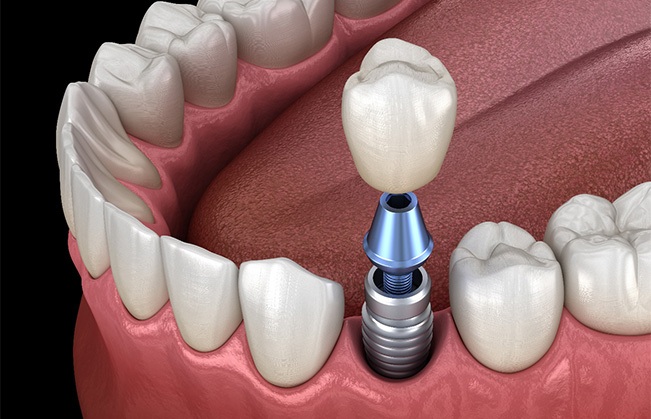
Those missing one tooth can get by with a single implant post and crown. After all, dentists can place these prosthetics between healthy teeth without upsetting your mouth. The implant would also be less invasive than a normal dental bridge; placing it won’t require any “prep” work. Best of all, your treatment results would be sturdier, longer-lasting, and more seamless than those from a bridge.
Missing Multiple Teeth
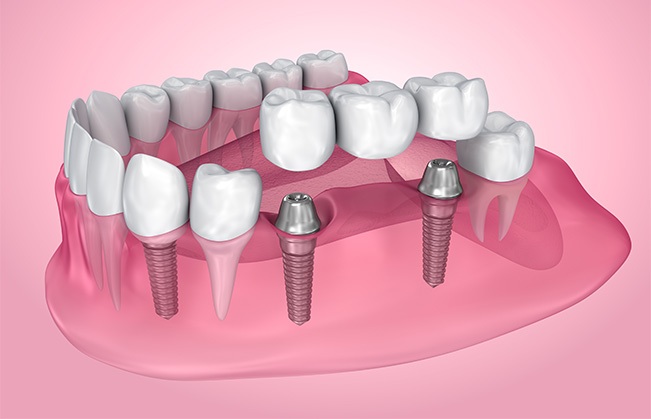
When a patient lacks multiple adjacent teeth, we typically suggest an implant bridge. This device secures itself with implant posts instead of “abutments” (i.e., nearby natural teeth) or adhesives. As a result, dentists don’t remove any enamel when placing it in your mouth. The appliance should also last longer than a regular dental bridge would.
If the missing teeth aren’t adjacent, we could place a partial implant denture instead. It would just anchor itself with a few dental implants.
Missing All Teeth
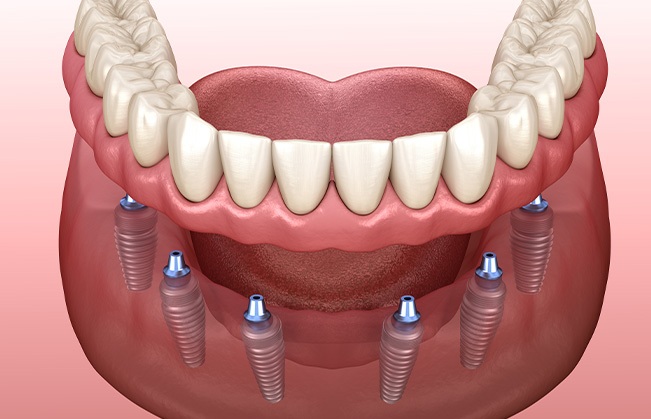
When someone has lost all their natural teeth, their best bet is usually an implant denture. This prosthetic uses four to six strategically placed implants to restore an entire arch at once. As an extra benefit, it also doesn’t slip around or fall like a traditional denture might. Instead, it remains stable and steady for many years, assuming the patient provides it with daily maintenance.
Dental Implant FAQs

Now that you've gone over the details provided above, you should have a better understanding of the procedure involved in getting dental implants in Covington. Of course, it's natural to have a few lingering concerns before moving forward with the process. To help you out, we've decided to address some of the most common questions we get asked from our patients. If you'd rather speak to our team directly, please feel free to reach out without hesitation!
Does Getting Dental Implants Hurt?
Before the procedure starts, your mouth will be numbed using a local anesthetic. Luckily, the jawbone contains relatively few nerve endings. It's likely that you will be sedated, which will reduce your body's sensitivity to pain. Although the surgery itself should be painless, you might experience some soreness in your mouth for a few days following the procedure. Follow instructions for taking prescribed or over-the-counter pain medication. Cold compresses can also provide relief. If the discomfort persists or worsens after two or three days, reach out to the dentist for further guidance.
How Successful Are Dental Implants?
When expertly placed, dental implants can achieve a success rate of about 95%. The longevity of your implants relies on diligent maintenance through oral hygiene, regular checkups, a balanced diet, and other factors. The success outcome can also be influenced by the implant's position in the mouth. Molars, for example, experience greater chewing pressure than front teeth, making them slightly more susceptible to potential challenges.
How Long Does It Take to Recover from Dental Implant Surgery?
You can typically return to your regular routines the day following the surgery. However, for the initial week, it's advisable to avoid strenuous exercise, as it might hinder the healing process. Bleeding should subside within the first couple of days, and swelling should diminish in three to four days. Be sure to follow the instructions for taking prescribed or over-the-counter pain relievers. The fusion of your implants with the jawbone might take up to six months.
Is There Anything I Shouldn’t Eat with Dental Implants?
In the initial few weeks post-surgery, steer clear of tough-to-chew foods. Refrain from drinking alcoholic, sugary, or acidic beverages, and avoid using a straw. Subsequently, your diet can include nearly all the foods you'd eat with natural teeth.
You will need to practice caution with certain foods. Sticky or chewy candies can potentially loosen or dislodge your restoration. Be mindful when consuming them or consider omitting them from your diet. Similarly, be cautious when chewing on foods like nuts and ice, as they have the potential to harm your implants, just as they might with natural teeth.
